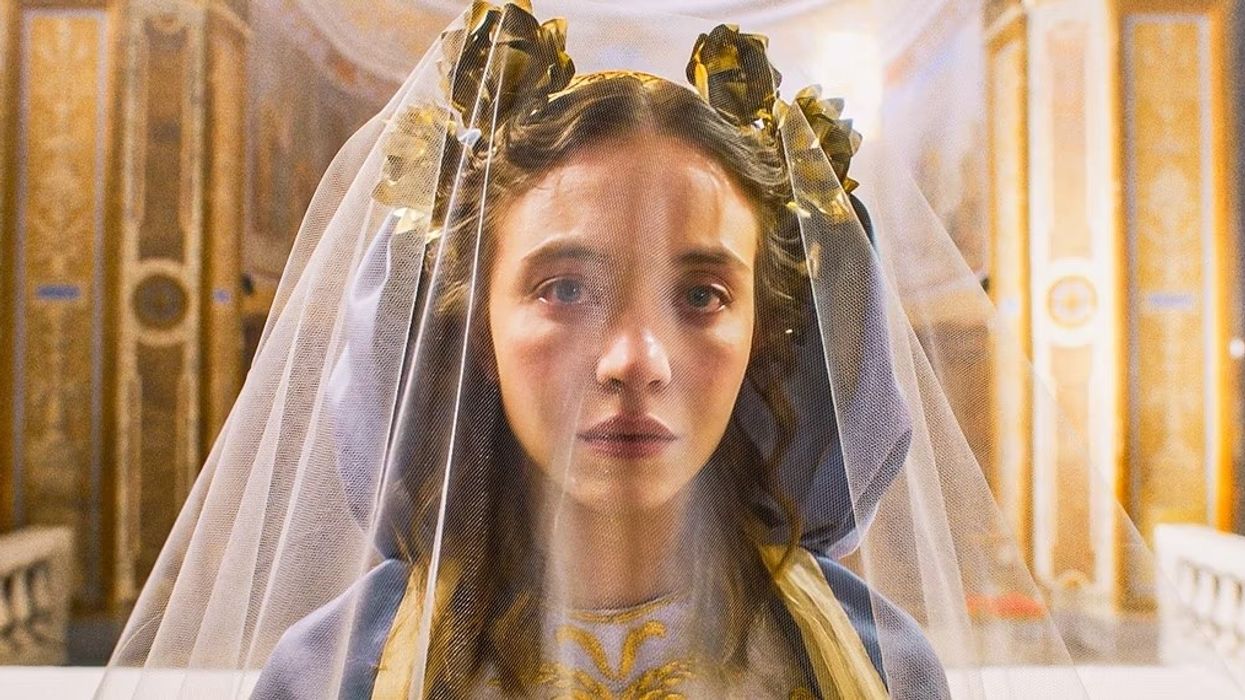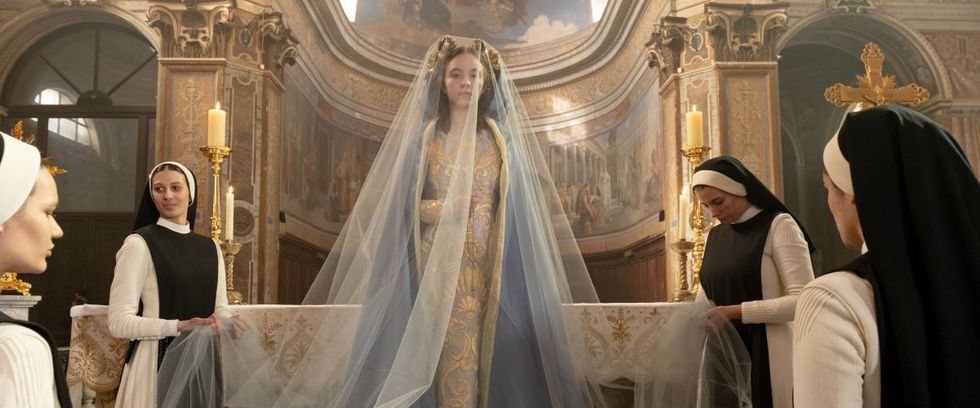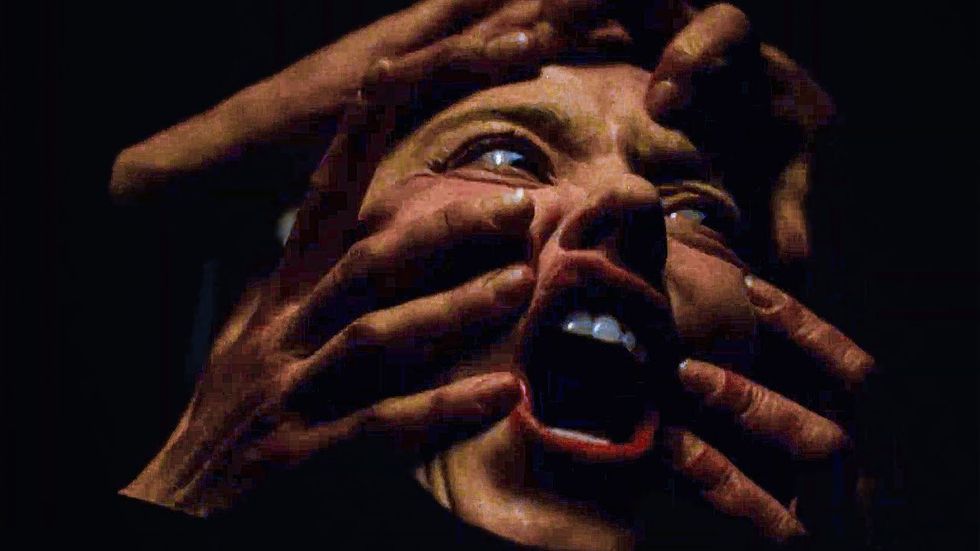Crafting the Horrific Soundtrack of 'Immaculate' with Will Bates
We speak to the prolific film and TV composer about his work on the new Sydney Sweeney lead horror film Immaculate.

Immaculate
Get ready to step into the shadows with composer Will Bates, because we're about to unravel the sinister symphony behind Immaculate, the new Sydney Sweeney starrer about a young nun who gets caught up in the evil plans of an Italian convent. When this character arrives, fresh-faced and excited, she has no idea what's in store until things get very, very dark. This is reflected in Bates' score, a challenging musical journey that takes us from the ominous to the upbeat (and even, briefly, into a Chrismas song).
The film is incredibly atmospheric, with a classic horror vibe that often throws back creatively to the 1970s. There's also, obviously, a healthy dose of church choir gravitas here. Bates' haunting melodies invite us to explore the dark catacombs of this tale, providing a soundscape that doesn't overpower the film but works beautifully to support its slightly off-kilter world.
We chatted with Bates just after the film's opening. Join us as this talented composer reveals the secrets lurking within the eerie score of Immaculate.
IMMACULATE - Official Redband Trailer - In Theaters March 22www.youtube.com
Editor's note: The following conversation has been edited for length and clarity.
NFS: How did you get into composing? What was your learning process?
Bates: Well, I guess I was about 6 or 7 years old, and I sang the whole of Star Wars to my parents in the kitchen one morning from start to finish. And they were like, "Huh." And they went and bought me a violin, which I was terrible at, but I continued playing for about seven or eight years. Which I really didn't like, but they were really just trying to get me to do something.
Then I gravitated towards the saxophone and, for a long time, thought I was going to be a jazz musician when I grew up, and then I ended up being a lead singer of a band and then discovering electronic music. But that whole time, I always thought about that 6-year-old kid singing that score. And when I understood that John Williams was this one person who had created all of these melodies, I realized that that's what I wanted to be when I grew up.
And I took a very weird way to get here. I rather naively thought that scoring commercials would be a route into scoring film, which at least back then, which is sort of the late 90s, it definitely wasn't, that world exists somewhat in parallel with the film world.
So I did that for a long time. I was an in-house composer at a music house in New York for seven years, and then eventually left there and started scoring short films, indie films, all of that stuff. I started a business that allowed some cross-pollination between commercials and film, but my first love has always been film composing, and I think there are other easier ways of getting into it.
But definitely starting out as a commercials composer made things easier for me when I started getting deadlines.
NFS: I know you've worked again in so many genres, but how did you approach this project specifically?
Bates: Well, this one, I mean, this is such a fun project for me. Horror is always fun, but this one especially, so I worked with Michael Mohan before on his previous movie called The Voyeurs, which is also a Sydney Sweeney movie.
And we met doing that, and then we became very good friends. And when he got brought along to direct this by Sydney, because Sydney produced this one, he brought me on board as well. And I think because we had already developed a shorthand together and we trusted each other implicitly, creatively, it allowed for this one to be quite experimental, and I was able to have a lot of fun with it.
And for a composer, I think that's such a huge part of the battle if you're needing to be creative, to not have a kind of fear of getting it wrong. And Michael is so encouraging and enthusiastic as a collaborator that I felt like I could really try stuff with this and not get into trouble in the process.
So yeah, that's kind of how it all began. And then I guess creatively, one of the first tasks, because I was involved quite early, they needed certain pieces of music to be written during production so that they could have them on set. So those were the first things that I had to do.
I had to write a hymn. There's a scene with Sister Cecilia and a bunch of nuns all singing a hymn together, I had to write that. And then another piece that was for a trio of nuns.
In the script, it just says, "A trio of nuns are playing music as she arrives at the convent." And he was kind of like, "What should that be?" I'm like, "I don't know. A zither, a hurdy-gurdy, and a psaltery?" And he's like, "Great." And he sent his props guy out in Rome to buy these instruments, and I did the same thing in LA, and I just started writing using those instruments, and it was a great way to get my feet wet to get started.

NFS: And that's what I love so much about film, TV, is that you just come up with things and then someone goes and makes it happen, or it just appears for you.
Bates: It's quite inspiring.
NFS: I was listening to the score today, a couple of tracks that I noticed were missing were those more upbeat songs. And also, was it "Carol of the Bells"?
Bates: That's right. Yeah, exactly.
NFS: So I'd love to know more about those pieces and how you arrived at them.
Bates: Well, you know what, the reason they're not on the album is because they're not my pieces. So there's a piece by, I should remember his name. I feel terrible that I can't remember his name. He's quite a famous Italian composer, Bruno something. There's a scene where Cecilia, it's one of the rare moments of levity in the whole film. Do you remember? She's hanging the washing—
NFS: The montage.
Bates: Exactly, it's a montage. So right at the very beginning, Mike was just like, "I want that track. And do you want to replace it?" I'm like, "If you want that piece, why don't you try and license it? If you can't get it, we'll have another meeting about it."
But in the end, they managed to get hold of it, and it was like this deliberately quite a big divergence from the tone of the score. At the end of that montage, the creepy real score comes back in, and it's like, "Oh, back here again." But yeah, it was too complicated, unfortunately, to include it on the album. I would've loved to, but it just wasn't possible.
And then "Carol of the Bells," yeah. Well, it's a very famous Christmas song, and I, for similar reasons, didn't include it on the record, but that was such a—I don't really want to give too much away about that scene, but it's such a specific feeling that he's trying to evoke there. It's a very, I'm not giving anything away by saying it's something of a brutal climax. And he wanted something that was going to be a huge contrast to that. And it's got a kind of bouncy buoyancy to it, hasn't it, that piece?
I'll say it was recorded by the choir that I used throughout the film, a wonderful choir based out of London called the Hi-Lo Singers. And they did a magnificent job of recording that piece and two other choral pieces. And then of course, all the stuff that I wrote as well.
NFS: That will lead us to my next question. How do you approach working with those sorts of voice-centered pieces with the chorus and churchy vibes?
Bates: With this one, it was so specific because it began with that one scene that I mentioned, and I suggested to Mike, "Why don't we have this be a Te Deum?" He's like, "That sounds cool. What's a Te Deum?" It's like, "Well, it's this Latin set text."
And I took that, I'm not sure if you're familiar with it, but it's like a sort of prayer to God. It's like an exaltation, a sort of almost a joyful hymn. It's been around for about 1,000 years. I took it and changed a few elements of it in my dodgy 15-year-old high school Latin, and had a friend help me with the grammar, and then wrote a melody around it.
And I wrote the melody actually on an instrument, this thing called a Hungarian zither, which is this very strange, it's an instrument that you play sort of horizontally, and it has about 40 strings on it, and you play it using your finger, running up and down this key bed. And the scale is very modal. It's very unusual, and I feel like as composers, we're always trying to introduce creative roadblocks to stop you from necessarily reaching for the more conventional answer to something. And that instrument was really helpful for me.
So I wrote a lot of the melodies in the movie on that thing, and then wrote the Latin text. And I have a wonderful singer that I've worked with a lot called Maya Mansa. She and I have done a bunch of projects together at this point, one of which was Michael's last film. And she's a friend. So I feel like I can do this with her. I
I'll sing it myself and then write out the part and then email it to her, and she'll send me back 50 takes of her doing it amazingly in various different styles. And so I was able to construct it that way before handing it over to the choir to add more parts.
But yeah, it was a very sort of natural way of working. I obviously had to build this quite quickly for the production, but then suddenly we had this piece and then I was able to use that in different forms throughout the movie. And because of the Te Deum, Michael was like, "It would be lovely if there was another vocal piece when Cecilia arrives, when she leaves the airport, and whatever." So I wrote another piece that's using the Requiem mass, a kyrie movement from that, and that became Sister Cecilia's theme throughout the rest of the movie. So it is a very vocal driven process.

NFS: Was there an especially challenging scene to score?
Bates: I think all of the scary stuff was so fun, and I have all these different ways of doing that. I think the one that was probably trickiest is one of the lighter ones, simply because we just couldn't decide what the tone of it should be. It's right as she's arrived, and she's just been given a tour of the convent by Sister Isabel, and her performance is very funny I think. She's quite dry and quite cutting.
And the question was like, we've had this quite horrific opening, and as an audience, we're very aware of what this place is, but she isn't, Sister Cecilia is still kind of intoxicated with this awe of where she is, it's so magical and new. So we decided in the end to do it from her POV, as a lot of the movie is generally, it's mostly from Cecilia's perspective.
And getting that tone was tricky. It needed to be light. It couldn't be kind of too playful. Had to still have elements of a bit of a subtext of something isn't quite right. But yeah, that one took a few goes.
NFS: Is there a piece of advice that you wish you would have known, getting into film scoring?
Bates: Blimey, that's a great question. I think that I was never really given this opportunity, partly because I lived in London when I was growing up, and there wasn't as big a community of filmmakers and composers as there is in Los Angeles, where I live now.
But a lot of the more conventional ways of younger composers getting into this racket is through shadowing and being an apprentice. I wish sometimes that I had done that when I was a bit younger to learn the craft from people that have been doing it for a long time. And I think that's partly why I ended up doing commercials. It was sort of my way in. And I think I found my own voice as a result. But sometimes, yeah, I think if there is a scenario where you can shadow a more seasoned composer, then I think that's a really useful thing to be able to do if you have that opportunity.
And also just to understand where music should be and where it shouldn't be. I think sometimes composers aren't necessarily deferred to as the experts to make those choices. And I think people would be surprised to hear that a lot of times composers are kind of like, "Oh, no." We're aware of the power of music. And sometimes you don't need to have it on the entire time.
So listen to one's intuition.













